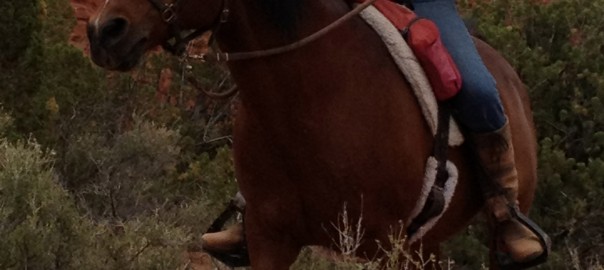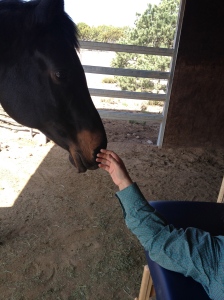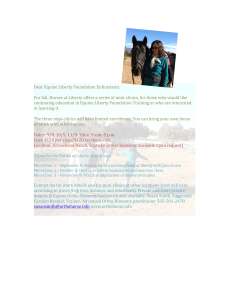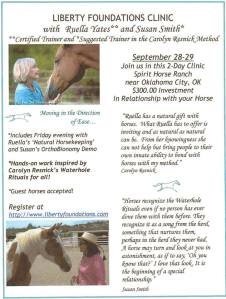Recently I had a client in my office who had a swollen ankle. She has had a swollen ankle before so I mentioned to her: rest, ice, compression, and elevation of the leg for self-care.
Self-care is a big part of my practice. I said, “okay, if your horse’s fetlock looked like this, what would you be doing?”
“Oh, my gosh, I’d have an ice boot on, I’d hose it down, I’d put on something and wrap it with vet wrap, and keep an eye on it until it goes down, and maybe call you out.”
“Exactly,” I said. “And it would be a good idea to take care of yourself as well as you take care of your horse!”
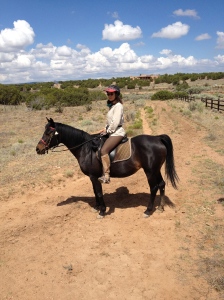 Most of my clients for bodywork who are not horses are horse people. Horse people populate my life and work, and we are all “cut from the same cloth, ” you might say. These are people who will suffer all kinds of physical insults from horses and know that it isn’t the horse’s fault. They hurt themselves bucking hay, training, riding, you name it. Horse work is not for sissies.
Most of my clients for bodywork who are not horses are horse people. Horse people populate my life and work, and we are all “cut from the same cloth, ” you might say. These are people who will suffer all kinds of physical insults from horses and know that it isn’t the horse’s fault. They hurt themselves bucking hay, training, riding, you name it. Horse work is not for sissies.
I actually got interested in bodywork because of horses, because so many of the things that happened to horses required costly veterinary procedures that often did not make the horse well or sound. There had to be another way because throughout the centuries we haven’t always had veterinary care and horses were treated with various other methods that we now call “alternative.” I wanted to know how to help my horses myself, so that I could learn more about equine care and lower my veterinary bills. Plus I wanted to do it “alternatively,” with bodywork, herbal remedies and homeopathics where possible. Ultimately, I learned how to maintain my horses with very little veterinary intervention.
Horse people characteristically spend money and time on their horses but not on themselves. When it comes to making an appointment, the horse will get the appointment before the person in the horse-centered family. Most of the time the reason horse people don’t get work done on themselves is because they feel their horse needs it more than they do. I need to buy hay, I had a large vet bill, I need bodywork for my horse, are the usual reasons people don’t get work for themselves.
In Michael Korda’s book Horse People, he talks about this dedication to horses and how out west you often see “Old Paint standing right behind the trailer, big as life, eating two squares a day while the family lives off food stamps.”
Korda also has an entire story about Rita Dee, a sculptor and “extraordinary horse person,” with seven horses and three children at the time, who with her husband had to choose between building the barn or the house when they bought their farm in upstate New York. They decided to begin with the barn since winter was coming on and the horses needed a place to stay. As a result, the family moved into the barn as it was built, and spent a year living in one of the stalls with the horses. During part of that time there was no electricity since an electric cable got cut, but that’s another long story in itself. I highly recommend this book for those who love horses and make life decisions largely based on their horses’ needs.
Since I’m the worst offender of this horse-centered behavior, I understand it and notice it right away in other people. Because I’m a bodyworker I have this brought to my attention really often, so I’m learning to take care of myself as well. When I first got into bodywork, some of my colleagues were surprised at how casual I was about my own health care.
Sometimes horse-centeredness includes the concern about getting to ride. A horse without legs and feet is not very useful. There are ways to enjoy horses that are unrideable (through liberty work, etc.) but for most people that is not the goal of owning a horse.
When I was in hospital for a long time, my goal was to be able to get back on a horse. I would have my friends come in and tell me what they were doing with their horses, describing their rides in great detail, and it helped me, it fed my dreams. I was unable to walk for quite awhile, so dreams were very important. Dreams of riding kept me from sinking into despair. After that experience, I won’t take my health for granted again, because it was so vital that I be able to be back with horses as I love to be.
The road back to riding was slow but very deliberate. When I first got back on my gelding Khami, I could only sit there for a few minutes. I was still walking with crutches at that time. My body certainly didn’t measure up to my wild riding dreams!
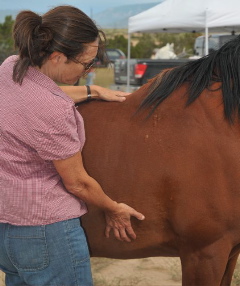 Many people helped me until I could do things by myself. Zarna Carter, EPR founder and instructor, did several horse and rider sessions with me in order to get me back in the saddle comfortably.
Many people helped me until I could do things by myself. Zarna Carter, EPR founder and instructor, did several horse and rider sessions with me in order to get me back in the saddle comfortably.
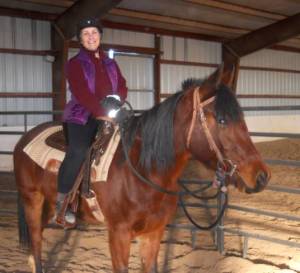
For those who have had a serious accident and find getting back in the saddle daunting, this horse and rider work can be vital for connecting you back up with your horse (a safe horse!), and instilling confidence back in your body and psyche. For the horse, it’s helpful for them to find a way to comfortably carry the injured rider that doesn’t exacerbate their own frailties. Some sessions without the horse are best for those who are not yet steady in the saddle, to get the body more aligned and balanced.
People can change because of horses. Sometimes the interest in the horse’s health will carry over to the owner. Perhaps the fact that horses carry us, they are our wings in many cases, tips us over the edge in our concern for their well being. But it’s also important for owners to be in good health because they pay the bills and provide for the horse as well as all their other responsibilities in life.
Getting work for yourself is valuable for your horse as well. You’ll find you can ride with more ease, you are not as stiff, you are more “in your body” and “aware,” and the horse recognizes it. You are in a better mood. That stiff right shoulder can open up when you make a turn to the right in the arena, and the horse doesn’t resist or stiffen at your movement. Your pelvis is no longer a lump in the saddle; it has working parts that can influence your horse (this is not to say everyone’s pelvis is a “lump” in the saddle).
Also it’s common after an injury to get all the parts sewn up by the doctor, only to find your body doesn’t feel like it did before you had an injury. This is generally a result of unresolved trauma that doesn’t show up on blood tests, x-rays, ultrasounds or MRIs. This is what the medical profession cannot help us with and another reason why we need bodywork to become reacquainted with our bodies and help our bodies reconnect and self-correct on many different levels.
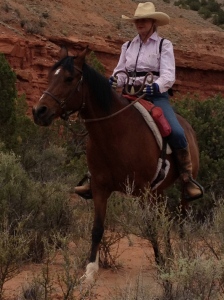 A good way to experience work on yourself besides having a people session is to have a horse and rider session. For those who want to experience horse and rider work, take advantage of $10 off one session with me – good for the rest of August through the end of September.
A good way to experience work on yourself besides having a people session is to have a horse and rider session. For those who want to experience horse and rider work, take advantage of $10 off one session with me – good for the rest of August through the end of September.
Services: Bodywork (Ortho-Bionomy for people, Equine Positional Release/Equine Ortho-Bionomy): private sessions, tutorials, phone consultations, distance healing and gift certificates
High Desert Riders meeting Tuesday, August 27th, 7 p.m. at Edgewood Community Center, Edgewood, NM – Bodywork talk and demos on horses and people, by Susan Smith
Liberty Training: clinics, mini-clinics, workshops, private and semi-private sessions, tutorials, consultations: by appointment: 505.501.2478 or emailing susansmith@orthohorse.info
Looking forward to Fall Liberty Training mini-clinics – Tell a friend and get to experience liberty work together! Dates: September 8, October 5, November 9 – 9-5 p.m. Contact me for details.
Liberty Foundations Waterhole Rituals Equine Clinic at Spirit Horse Ranch near Oklahoma City, co-teaching: Ruella Yates, Certified Carolyn Resnick Trainer and Susan Smith, Suggested CR Trainer. Liberty Horse Training. September 28-29, 2013. Contact Ruella Yates at ruella@libertyfoundations.com, or 405-771-4274. Susan will be giving a three-hour tutorial on her OrthoHorse bodywork for a limited number of students. Call 505-501-2478 or email susansmith@orthohorse.info for details.



